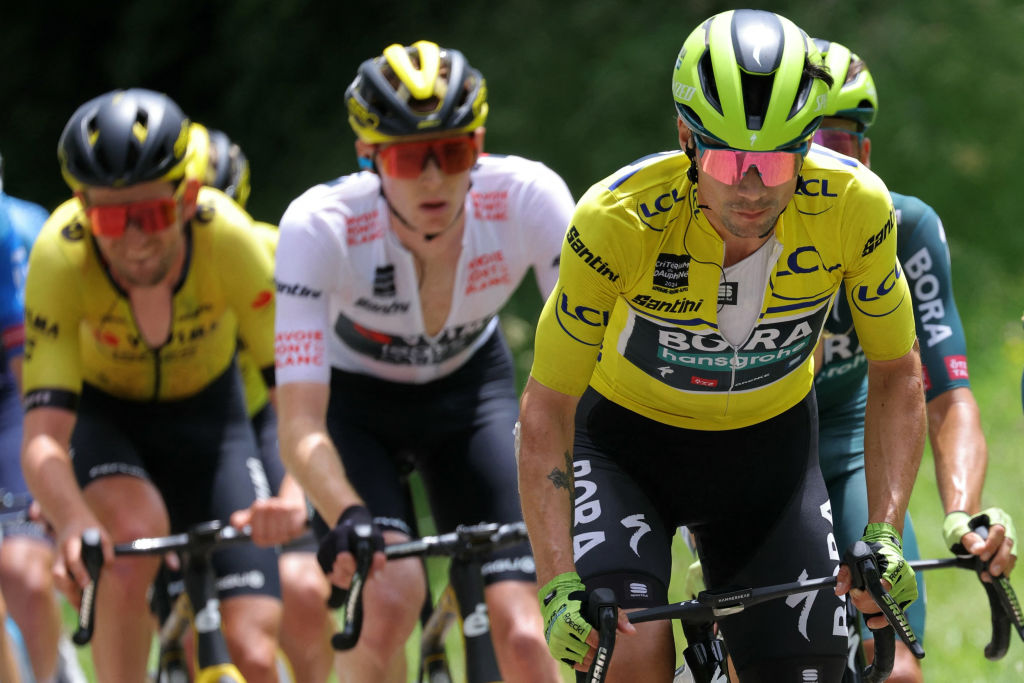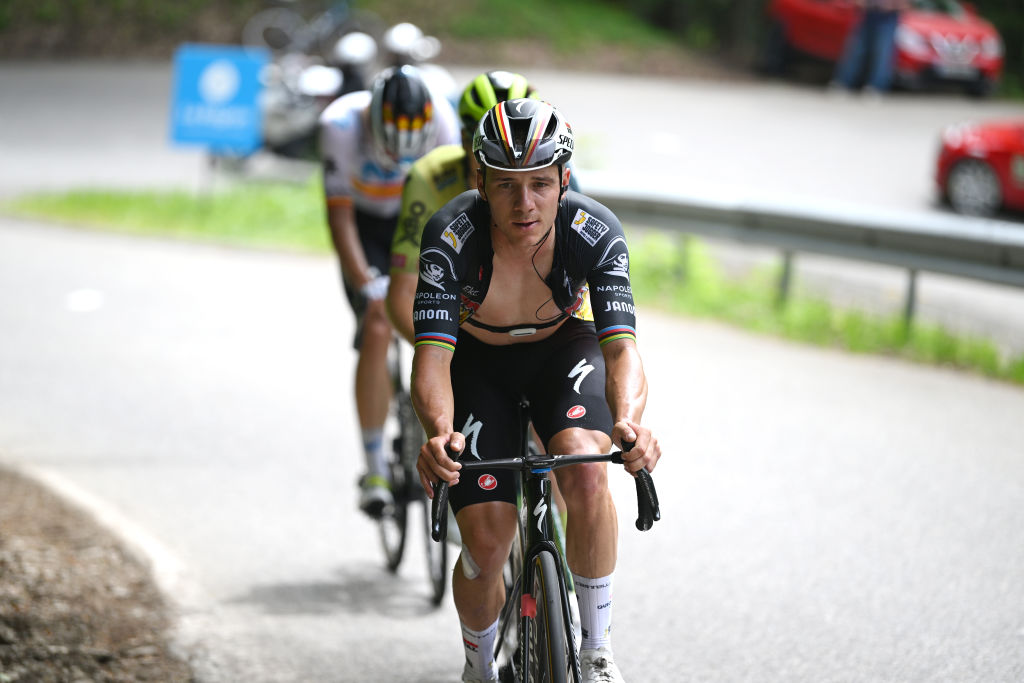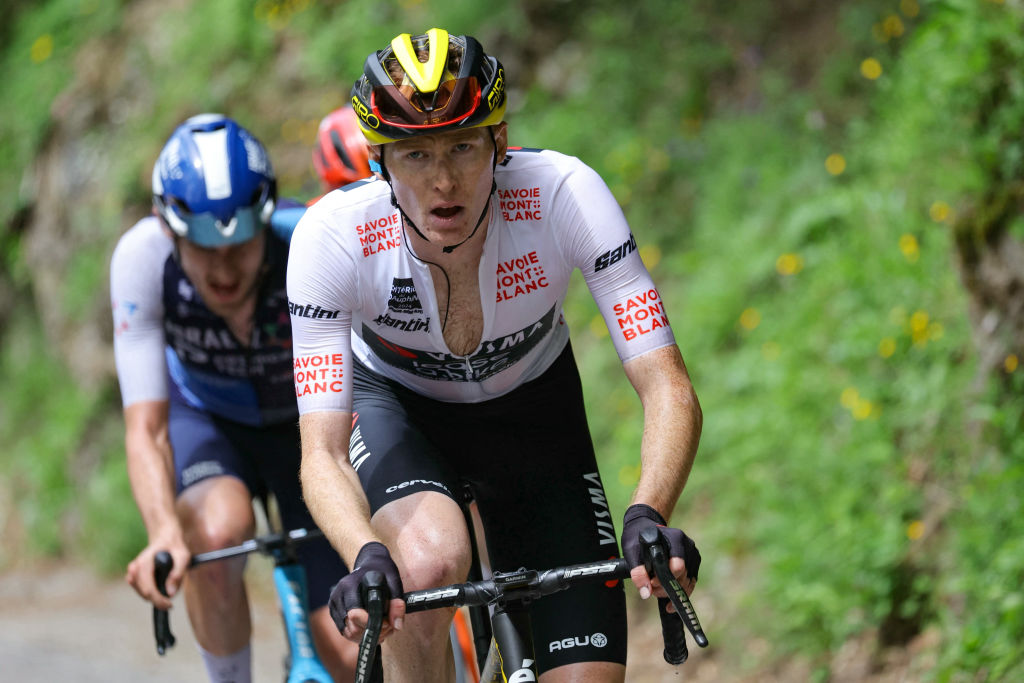
The Critérium du Dauphiné is often billed as a mini Tour de France. Featuring some of the roads and climbs of the three-week race, so the thinking goes, it is meant to give an indication of who the major players are going to be in July.
For certain editions that may well have been true, but it does depend on who is on the start line and how the route is laid out. This 76th edition looked on paper to be a constant slog over undulating terrain until the final weekend when it became properly mountainous, with a midweek time trial there to establish some kind of GC order for the climbers.
Coming in, the main favourites were a mixed bunch. There were Remco Evenepoel and Primož Roglič, both on the comeback trail after crashing out of Itzulia Basque Country, and Juan Ayuso, who had won that race. Then there were Matteo Jorgenson, Carlos Rodríguez and Alexandr Vlasov, who were expected to be involved in a serious way. On the next level of interest came Mikel Landa, Tao Geoghan Hart, Jai Hindley and maybe, for the French interest, David Gaudu.
Yet from this quartet Geoghan Hart was rebuilding his confidence, Hindley was likely to be looking after Roglič, while Landa was there to guide Evenepoel through his return to racing up mountains. Gaudu would have been mainly hoping for a glimpse of form.
The Dauphiné is a beautiful event if it’s sunny but grim if it isn’t and so when the rain came the race changed from a form indicator into a test of inner strength and quite literally survival. Crashing less than a month before the Tour is costly in terms of energy lost and a disaster if a rider is seriously injured.
In that sense, Visma-Lease a Bike’s dismal season continued losing Dylan van Baarle and Steven Kruiswijk. For Ayuso and Geoghan Hart their retirements were less threatening – but not ideal when they would have been looking to refine their form.

Roglič scoring his first GC win for Bora Hansgrohe will be seen as no great surprise, and winning two mountaintop finishes with his devastating sprint in those situations was a sign that he still has that in his locker and even though he was only third in the time trial, his ability against the watch remains. Though it’s no longer the benchmark, it’s better than most of those aiming at him.
What was clear, though, was the one bad or average day is still a risk. That could have been because of the climatic conditions endured or – far more likely – because he still has work to do before he is at his best. Though he wasn’t as badly injured back as Evenepoel or Jonas Vingegaard in the Basque Country, his preparations will have been less than ideal, and I think it showed in how he raced more conservatively than he usually would.
His top-end power seemed to be good, but he was maybe lacking a little endurance and resistance to race pace when it’s really tough. For his and the team’s confidence, they would be happy with the win, but they remain aware that this wasn’t the best Primož Roglič.
Remco Evenepoel started the race talking himself out of the GC battle, and ultimately he wasn’t directly involved in the mountain stages. There was the TT victory, however, and he did finish seventh – not exactly shabby considering how smashed up he was in the Basque Country incident.
Clearly retaining his time trialling strength, he carefully managed each day after briefly taking the race lead by not pushing himself too hard unless he felt he could sustain that effort all the way to the finish. On stage 6 on the Collet d’Allevard, he paced himself most of the way up then raced the last 2km.
The next day, he did the same except he opened it up for the final 3km and on the last day, he repeated that at 5km to go, so he was testing what he was capable of doing and crucially finding out what he needs to work on during the period up to the Tour start in Nice.
It’s an interesting conundrum for Roglič and Evenepoel as they were both off their top level, with the Slovenian missing that little bit of resistance and the Belgian champion some top-end power. For the latter, an altitude camp will probably be more beneficial for his form as that would have been a limited option as he healed from his injuries.

Jorgenson's progression and Gee's breakthrough
We’ve yet to hear if Jonas Vingegaard will be present at the Tour and I’m sure Visma would like that to be the case but with Matteo Jorgenson’s progression this year they will have someone involved in the GC at least. The level will be higher again than at the Dauphiné and it ought to be much warmer too, so we’ll see where the tall American fits into the stage racing hierarchy.
He can take a lot of confidence from how he raced, always near Roglič on most of the mountains and in the TT, and he was willing to seize the opportunity when it presented itself. The winner of this year’s Paris- Nice was a surprise in one sense that he climbed with the best and a confirmation of the talent he has shown previously.
The other major awakening was Derek Gee, and that was a surprise to him and probably everyone else too. Given he would usually win from surviving in breakaways, his stage victory from a reduced peloton sprint came as a shock. He followed that by being present in the mountains and he showed that he was in great form by taking the initiative on occasion. Being on the podium at the end of eight stages was a remarkable result for the Israel Premier Tech rider and one which ought to change his perspective from now on.
Carlos Rodríguez finished just off the podium though crucially he won the final stage and that confirmed what we know about his recovery during multi-day events. He got better as the race went on and though his TT didn’t seem that great, he was only about a second/km slower that Jorgenson. That’s pretty good for someone considered more of a specialist climber.
With Rodríguez and Laurens De Plus, Ineos had a pretty solid race, much more confidence-inspiring than their stage racing to date. The Spaniard is another of those riders who performs better when it’s warm and dry so his and the team’s confidence will have come away from the Dauphiné with renewed confidence, though there’s still the question of sole or shared leadership at the Tour to resolve. How Tom Pidcock and Egan Bernal perform in Switzerland will answer that dilemma.
Looking solely at the result of the Dauphiné, Roglič’s second overall victory seemed predictable as he doesn’t need a lot of race days to be in form. But his form, like that of Evenepoel, does need a little more work before they can line up in Nice alongside Tadej Pogacar, who let’s not forget has set the bar pretty high so far this season.
On the level just below, the confirmation of Matteo Jorgenson and Carlos Rodríguez’s talents will be interesting to watch at the Tour. They now sit in that category with the likes of Juan Ayuso, Jai Hindley, the Yates twins, Sepp Kuss and Richard Carapaz where expectations become that little bit higher.







